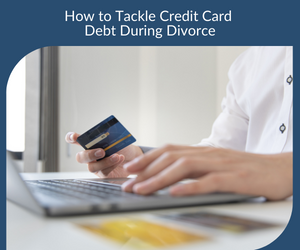
Divorce is tough—especially when it has an impact on one’s financial health. It can be scary for one spouse to think that the other spouse’s credit card debt can negatively affect them, even if they weren’t the one spending the money. Or perhaps both spouses have incurred the debt together. What if it prevents one from getting approved for a mortgage for a new home or from refinancing the mortgage on the current residence? What if the payment is split between the two spouses, and now the spouse who did not incur the debt has to sacrifice their own financial goals?
The good news is that there are ways that someone going through a divorce can help prevent these headaches caused by credit card debt. First and foremost, if one does not have an experienced divorce attorney by their side, we highly recommend that they find one so they can lean on them for advice. Additionally, the following tips can help someone approaching a divorce handle credit card debt before it becomes a problem:
- Know the Details – Listing out all the details for each credit card owned either by one spouse or both spouses is a great starting point. We recommend making a list of each credit card, who owns it, and how much debt has been incurred, so they have the appropriate information when consulting with their attorney on the next best moves.
- Plan to Pay Off the Debt – Regardless of whether the debt was incurred on a credit card account titled in only one spouse’s name, if the debt was incurred during the marriage, it is marital debt and part of the marital estate. The court can require one party to be responsible for all or part of the credit card debt regardless of whose name is on the account. However, it is important to note that the credit card company can pursue both spouses for the debt to be resolved if it is a joint account and the balance is not appropriately handled. Both parties should work together to have account balances paid off to end the possibility of further problems relating to the debt.
RELATED: Read these tips to develop a pre-divorce budget.
- Close Joint Accounts – As account owners of the credit card, both spouses are legally responsible with paying off debt. To help ensure the other spouse does not incur vengeful debt, close the joint accounts as soon as you can. Along the same lines, if one spouse has a credit card in their name, and the other spouse is an authorized user on the credit card, take the necessary steps to eliminate the additional user.
While it may not seem possible at the time, handling credit card debt prior to the divorce being finalized is key. A divorce attorney can be an important partner when going through a situation like this, and they should be consulted with before any sudden moves are made.
If you find yourself approaching a divorce and need someone to help guide you through credit card debt or other aspects of the divorce, our attorneys who are well-versed in all family law matters can help. Contact us now to set up a consultation however it is most convenient for you—via telephone, video, or in person.
FAMILY LAW SERVICES
Divorce
Legal Separation
Prenuptial & Postnuptial Agreements
Tax Issues
Fees
Adoption
Same-Gender Marriage
Domestic Partnerships
Child Custody
Family Support
Mediation in Divorce Matters
Collaborative Law Services










